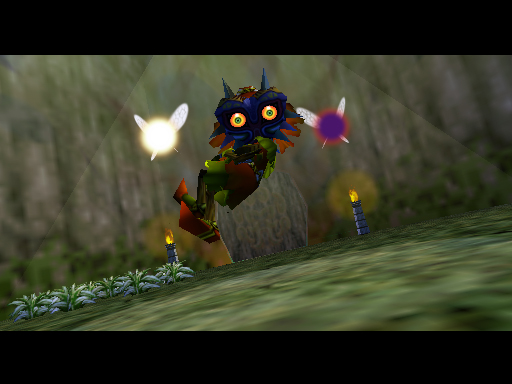Tags: BioWare; David Gaider
<p>Bitmob conducted an interview with BioWare's Dave Gaider.</p>
<p> </p>
<p>Here's an excerpt from <a href="http://www.bitmob.com/articles/david-gaider-interview-part-i-working-for-bioware-and-the-writing-process" target="_blank">the first part</a>:</p>
<blockquote>
<p><strong>LG: How much freedom did you have with writing different aspects of the game?</strong></p>
<p><strong>DG:</strong> Some. As lead designer, I have a little more freedom. If someone is a senior writer, I would give him a plot with a general plan, and he would be responsible for going ahead and breaking it down into more detail.</p>
<p>He doesn't usually have the freedom to create his own characters…minor ones -- yes…but the major ones -- no. They don’t get to decide the major plot. A more junior writer basically gets handed a much more detailed plan. They’re more responsible for implementing that.<br /> <br /> As a lead writer, you get a little bit more freedom -- I’m given parameters as in "this is what we need the story to be" or the lead designer talks to me about the overall vision for the story.</p>
<p>We toss ideas back and forth. And then in the end, once I understand the parameters that the game’s story has to be made with, and I create that.</p>
<p>Inside those parameters, I actually have a lot of freedom, so that part is gratifying. It’s not a case of me deciding I want to write this story. In that respect, I have little freedom [laughs].</p>
</blockquote>
<p>And this one's from the <a href="http://www.bitmob.com/articles/david-gaider-interview-part-ii-creativity-and-the-novels" target="_blank">second part</a>:</p>
<blockquote>
<p><strong>LG: What do you think about the video-game medium and its story telling ability?</strong></p>
<p><strong>DG:</strong> Well, it has a lot of limitations that you don’t necessarily deal with in other mediums. Like in a book.</p>
<p>I’ve written a couple of novels now [<em>Dragon Age: The Stolen Throne</em> and <em>Dragon Age: The Calling</em>].<em> </em>When it comes to a book, I can put down on paper anything that’s in my imagination; however, in a video game, you have physical limitations in technology and of what you can actually show.</p>
<p>Where games are excellent is in the interactive part. You don’t get that in passive entertainment.</p>
<p>In those, you watch a character, but I don‘t think you would identify as strongly as in a game where you’re the one who directs the action. You have agency in a video game, whereas you don't in a movie or a novel. I think that changes the nature of the entertainment substantially, and that’s where the opportunities come in.</p>
<p>Anything that gives the player more immediacy in their agency will cause them to feel more of an element from it. And it’s not necessarily an element of choice. I know that’s intrinsic to a role-playing game, but I think stories are possible in genres other than RPGs.</p>
</blockquote>
<p>Spotted at: <a href="http://www.gamebanshee.com/news/99429-david-gaider-interview-part-two.html">GB</a></p>
<p>Bitmob conducted an interview with BioWare's Dave Gaider.</p>
<p> </p>
<p>Here's an excerpt from <a href="http://www.bitmob.com/articles/david-gaider-interview-part-i-working-for-bioware-and-the-writing-process" target="_blank">the first part</a>:</p>
<blockquote>
<p><strong>LG: How much freedom did you have with writing different aspects of the game?</strong></p>
<p><strong>DG:</strong> Some. As lead designer, I have a little more freedom. If someone is a senior writer, I would give him a plot with a general plan, and he would be responsible for going ahead and breaking it down into more detail.</p>
<p>He doesn't usually have the freedom to create his own characters…minor ones -- yes…but the major ones -- no. They don’t get to decide the major plot. A more junior writer basically gets handed a much more detailed plan. They’re more responsible for implementing that.<br /> <br /> As a lead writer, you get a little bit more freedom -- I’m given parameters as in "this is what we need the story to be" or the lead designer talks to me about the overall vision for the story.</p>
<p>We toss ideas back and forth. And then in the end, once I understand the parameters that the game’s story has to be made with, and I create that.</p>
<p>Inside those parameters, I actually have a lot of freedom, so that part is gratifying. It’s not a case of me deciding I want to write this story. In that respect, I have little freedom [laughs].</p>
</blockquote>
<p>And this one's from the <a href="http://www.bitmob.com/articles/david-gaider-interview-part-ii-creativity-and-the-novels" target="_blank">second part</a>:</p>
<blockquote>
<p><strong>LG: What do you think about the video-game medium and its story telling ability?</strong></p>
<p><strong>DG:</strong> Well, it has a lot of limitations that you don’t necessarily deal with in other mediums. Like in a book.</p>
<p>I’ve written a couple of novels now [<em>Dragon Age: The Stolen Throne</em> and <em>Dragon Age: The Calling</em>].<em> </em>When it comes to a book, I can put down on paper anything that’s in my imagination; however, in a video game, you have physical limitations in technology and of what you can actually show.</p>
<p>Where games are excellent is in the interactive part. You don’t get that in passive entertainment.</p>
<p>In those, you watch a character, but I don‘t think you would identify as strongly as in a game where you’re the one who directs the action. You have agency in a video game, whereas you don't in a movie or a novel. I think that changes the nature of the entertainment substantially, and that’s where the opportunities come in.</p>
<p>Anything that gives the player more immediacy in their agency will cause them to feel more of an element from it. And it’s not necessarily an element of choice. I know that’s intrinsic to a role-playing game, but I think stories are possible in genres other than RPGs.</p>
</blockquote>
<p>Spotted at: <a href="http://www.gamebanshee.com/news/99429-david-gaider-interview-part-two.html">GB</a></p>









![Glory to Codexia! [2012] Codex 2012](/forums/smiles/campaign_tags/campaign_slushfund2012.png)





